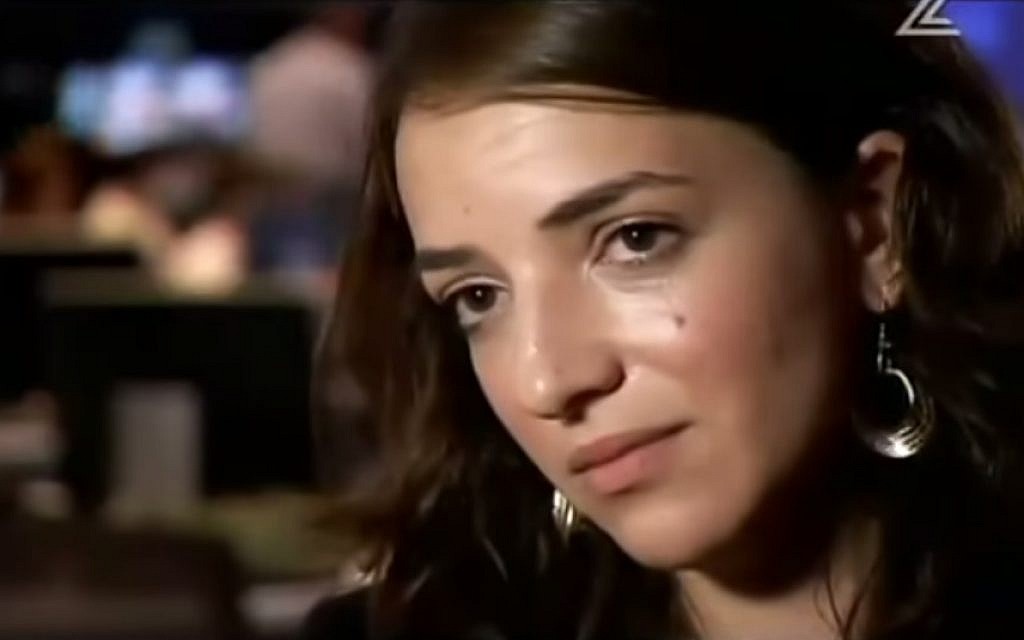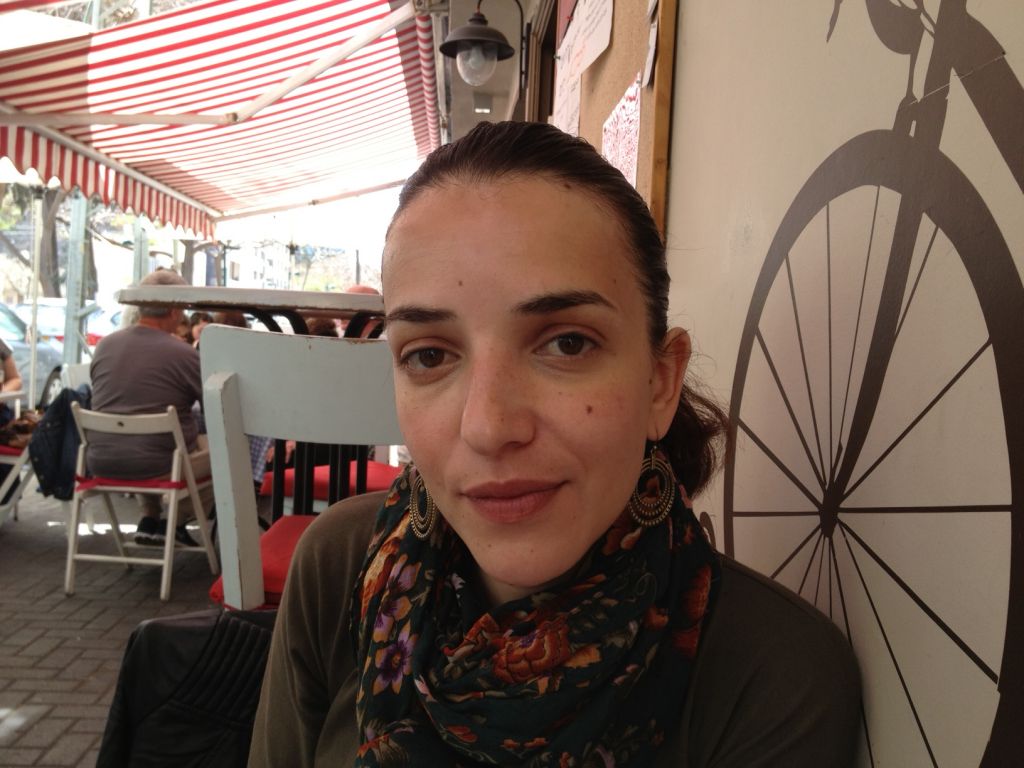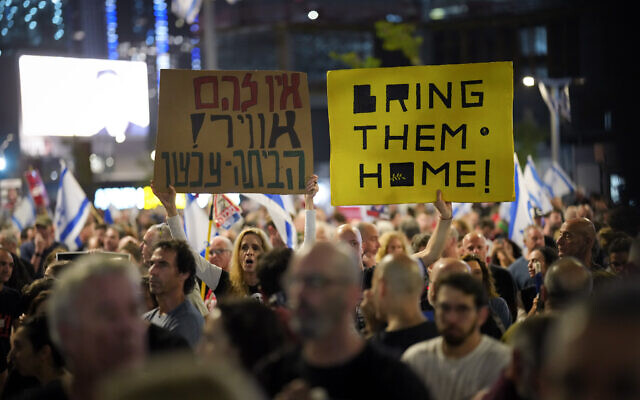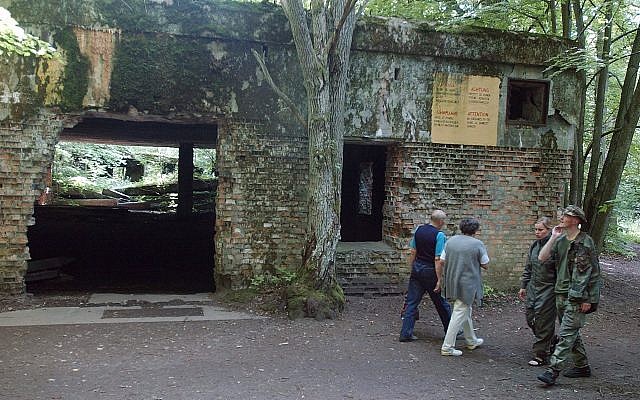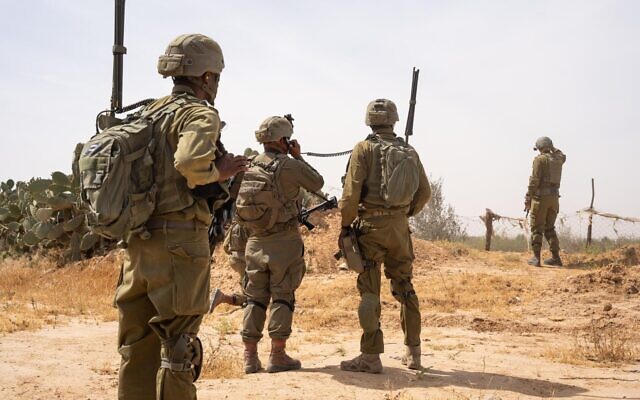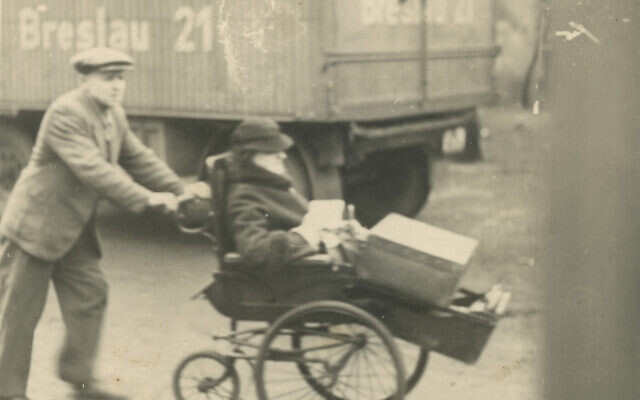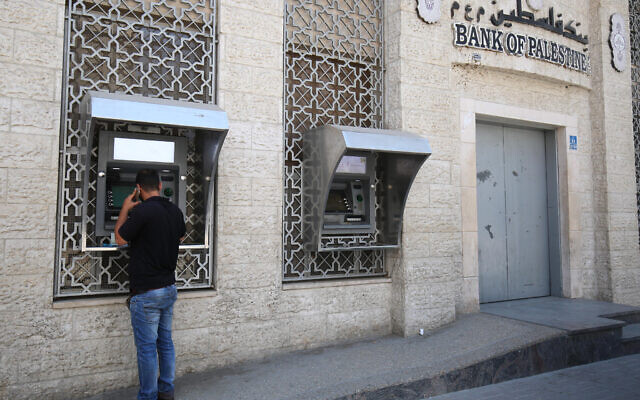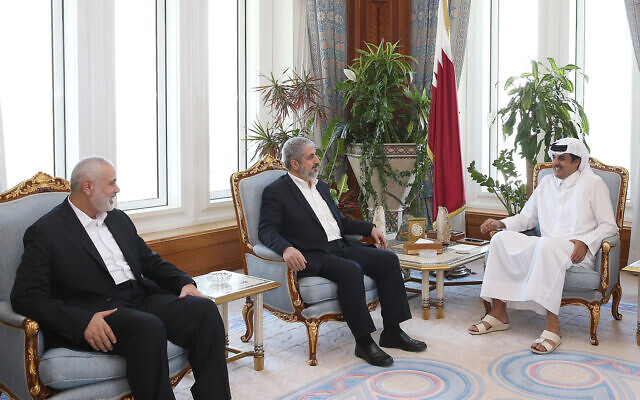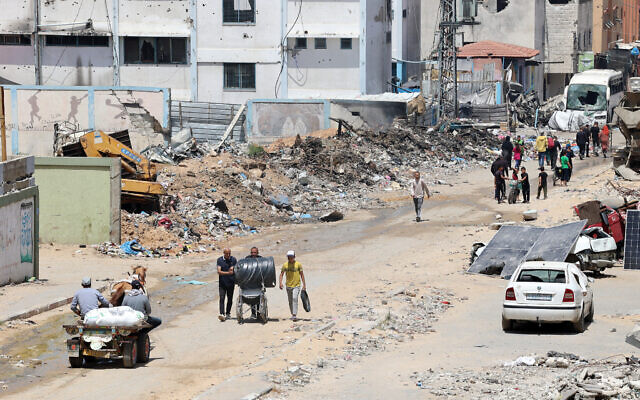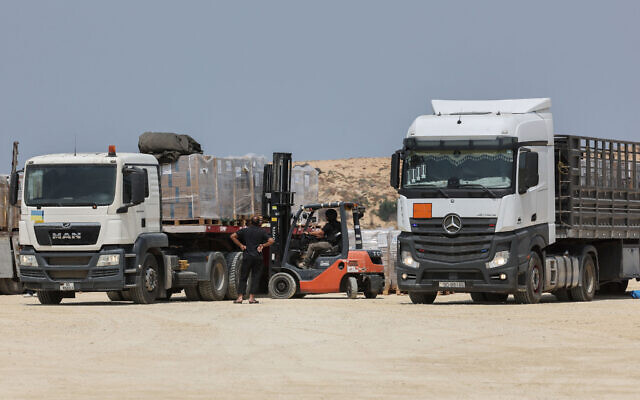A survivor of terror, Israel’s first Arab news presenter is done being a victim
Lucy Aharish, chosen to light a torch on Independence Day, tells of her journey from Dimona to prime-time television
Lucy Aharish was a 5-year-old girl who had just finished clothes shopping with her parents in Gaza when the family vehicle was attacked by a terrorist.
“It was April 1987, a very hot day, and my dad opened the window,” she recalled. “I remember a traffic jam on the main road and I saw someone approach us with something in his hand. I looked at him and he looked back at me, and I automatically started sliding down on my seat in fear. My mother shouted ‘Lucy, sit up straight,’ and when she finished her sentence we heard a bang in the car.”
The terrorist had shoved a Molotov cocktail into the car — which her father quickly ejected — and threw another on top of the vehicle which ignited, enveloping it in flames. Lucy and her parents escaped unscathed, but her 3-year-old cousin suffered severe burns all over his body and was hospitalized for months.
“The man’s face is etched in my memory,” Aharish told The Times of Israel earlier this month in a Tel Aviv cafe in her unaccented Hebrew. “Growing up, I couldn’t understand how someone could be so evil.”
That terror attack became a seminal episode in the life of Aharish, who would grow up to become Israel’s first Arab presenter on prime-time television. Last month, she was awarded one of Israel’s highest honors: to light a torch at the national Independence Day ceremony on Mount Herzl, whose theme this year is “groundbreaking Israelis.”
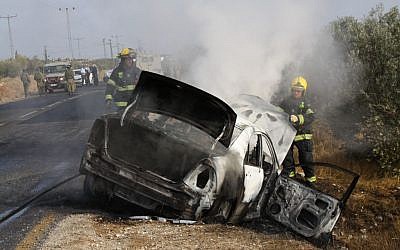
Aharish is a “trailblazing Muslim journalist, who brings a discourse of tolerance and interdenominational openness to Israel’s public agenda,” wrote the Ministerial Committee for Symbols and Ceremonies headed by former cultural affairs minister Limor Livnat, explaining its choice of the 33-year-old media icon.
But identity is hardly that clear-cut for Aharish. Last July, as Israeli troops were engaged in house-to-house fighting on the streets of Gaza, she wrote on her Facebook page: “I am neither an Arab nor a Jew. I am neither Christian, nor Muslim nor Druze nor Buddhist nor Circassian. I am neither left nor right. I am neither religious nor secular. I don’t want to see children kidnapped and murdered; I don’t want to see children burnt to death. I don’t want to hear sirens or see missiles launched… I do want us to open our eyes to the rage and hatred that are eating us alive.”
In her conversation with The Times of Israel, Aharish sounded somewhat more subdued. “Today, when people ask me ‘What are you?’ I say that I’m an Israeli. I’m not ashamed of my Israeliness. Then I’m a woman, and then I’m an Arab Muslim. That’s the order: Israeli, woman, Arab Muslim.”
It took time for Aharish to develop a nuanced view of the conflict. As a victim of terror growing up in the Jewish development town of Dimona, she said she was ‘very anti Arab culture’
It took time for Aharish to develop a nuanced view of the conflict. As a victim of terror growing up in the southern Jewish development town of Dimona, she said she was “very anti Arab culture.” The child of secular parents who moved from Nazareth in the early 1970s following an attractive job offer her father received, Aharish grew up speaking a melange of Hebrew and Arabic at home (“we would always quarrel in Arabic”), and relating to a Holocaust survivor neighbor named Menahem as a grandfather, having never known her real grandparents.
“I gleaned so much from Jewish-Israeli culture; I didn’t even know what the Nakba — a Palestinian term denoting the national catastrophe that followed Israel’s creation — was,” she said.
Escaping her national heritage in school proved impossible, however. Aharish was bullied and would sometimes find graffiti calling her a dirty Arab scribbled on the bathroom walls.
“It wasn’t an easy childhood,” she said. “There were terrible terror attacks in the early 1990s, and arriving at school in the morning you knew you’re an Arab and you would inevitably hear very difficult things. You’d hear ‘Death to the Arabs,’ and ‘Kill them all.’ Suddenly, someone would notice you standing there and say, ‘Yeah, but you’re not like them, Lucy; you’re different.'”
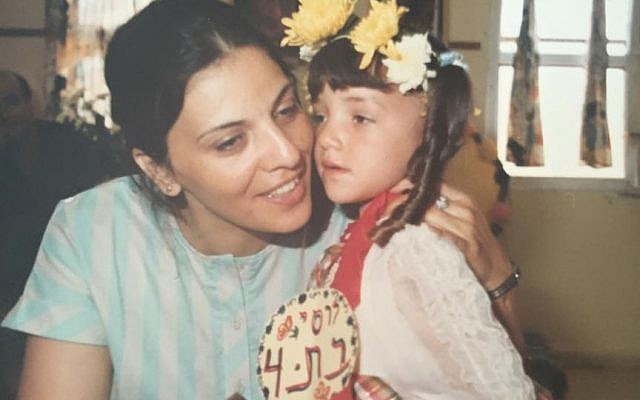
Aharish praised her high school principal Meir Cohen, later to become Dimona mayor and most recently minister of welfare and social services as a member of the Yesh Atid party, for his uncompromising stance against racism.
“Violence and racism were never tolerated. He would stop the school day every time graffiti was written about me. He would stand in front of the entire grade and say, ‘This will not happen in my school. Racism is something that no decent society, and especially not Jewish society, can tolerate.’ I don’t know if such principals exist in today’s education system.”
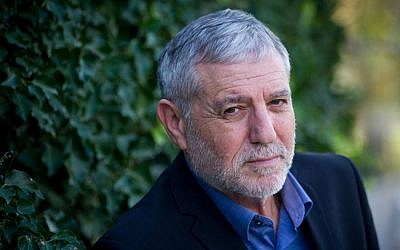
But the paradigm shift occurred only when Aharish left home to study at Jerusalem’s Hebrew University when she turned 18.
“I was riding a bus on Route 1 — which separates East and West Jerusalem — when, looking out the window, I saw a soldier remove four young men from a van and ask them to face the wall and lift their shirts, as he held their ID cards and pointed his gun at them. I said to myself, ‘Wow, there’s something I didn’t know before. No human being deserves to be humiliated like that.'”
‘As long as we view ourselves as victims, we’ll amount to nothing’
Aharish is sick and tired of the “victimhood discourse” she claims permeates Israeli society, but is markedly more pronounced among Arabs.
In the aftermath of the recent elections, she was accused by a representative of the Arab nationalist party Balad of “blaming the victim” on a TV debate she moderated.
‘I said to him, ‘Who’s a victim? Are you a victim? That’s your problem. I’m nobody’s victim… The day we Arabs stop viewing ourselves as victims will be the day we can start progressing and demanding our rights’
“I said to him, ‘Who’s a victim? Are you a victim? That’s your problem. I’m nobody’s victim…. The day we Arabs stop viewing ourselves as victims will be the day we can start progressing and demanding our rights. But as long as you view yourself as a victim, you’ll never amount to anything.'”
That brazen outspokenness has placed Aharish in hot water with some of her Arab compatriots. When Aharish spoke out publicly against Balad MK Hanin Zoabi for justifying the kidnapping and killing of three Israeli teenagers last year, she was accused by social activist Hanin Majadli of suffering from “an identity crisis.
“There’s no need to embellish reality to be liked by Israeli mainstream. Enough with the disgusting ‘pet Arab’ policy,” Majadli wrote on Facebook in June 2014. “Most Palestinians in Israel don’t consider kidnappings to be terrorism. They see it as an act of resistance to the continuing Israeli terror in Gaza and the West Bank. On the other hand, we cannot accept hostages being harmed or killed. The goal is to use them as bargaining chips for releasing prisoners.”
Aharish claimed she doesn’t take such criticisms to heart. “I don’t read them,”
she said. “I respect their identity, but this is my identity, and let them say whatever they want. I’ve never judged people.
‘Today, when people ask me ‘What are you?’ I say that I’m an Israeli. I’m not ashamed of my Israeliness. Then I’m a woman, and then I’m an Arab Muslim. That’s the order: Israeli, woman, Arab Muslim’
“The problem is that we really love looking back at the past,” Aharish added. “We say: ‘In 1948, such and such happened; in 1967, such and such happened… What about the present? After we’ve cried, how do we solve what’s happening now? How do we deal with the fact that people think Arabs are the enemy? That if I speak Arabic in this café I’ll get at least two stares?”
The same victimhood discourse is true for Israel’s attitude to advocacy — or hasbara — she opined.
“With regard to the Arabs, Israel constantly presents itself as the victim. ‘The entire world is anti-Semitic,’ goes the party line. Instead, we should strive to show the truth as it is… It’s much more complex than saying ‘We’re right and you’re wrong.'”
‘An Arab will never present the main news broadcast in Israel’
Initially, Aharish didn’t plan to be a journalist. Her dream, coming out of high school, was to be an actress. “The ability to make people laugh or evoke emotion in them always amazed me,” she explained. But her father had other plans. He told her she should first get a diploma and then “do whatever she wants.”
So Aharish enrolled in theater studies and political science at the Hebrew University. After graduation, she spent two years studying journalism at the Koteret school in Tel Aviv, followed by a six-month media internship in Germany.
Upon her return to Israel, in February 2007, she was hired by Channel 10 TV, to become Israel’s first Arab news presenter. Soon, she was given the Palestinian Affairs beat, reporting regularly from the West Bank.
“Interviewees would say, ‘Wow, you speak such good Arabic.’ I’d say I’m Arab, and would then have to produce my ID card and prove it.”
It took time for her Palestinian interlocutors to get used to the idea of speaking to a female Arab journalist to whom they can’t easily give the runaround.
‘An Arab will never, ever present the central news broadcast. The powers that be don’t have the courage’
“It’s a completely different ball game. Arabs will tell Jewish journalists what they want to hear, but there’s a different music with an Arab journalist,” she continued. Aharish said she won the respect of West Bank Palestinians by “speaking to them at eye-level, like a friend.”
Over her relatively short career as a TV journalist, Aharish has gained experience in a range of fields: from West Bank reporter to entertainment correspondent on the Guy Pines show; and from news presenter on Channel 10 prime time to editor of an afternoon children’s news bulletin on Channel 1. She has even realized her acting dream, playing minor roles in a number of Israeli feature films and in the 2013 blockbuster World War Z, starring Brad Pitt.
But one job she can never attain, she claimed, is presenter of the evening news broadcast on an Israeli news channel.
“It’s not a matter of racism as much as it’s the decision makers’ fear of the stereotype, or of possible criticism. This fear is unfounded, because viewers have already accepted [an Arab anchor]. But an Arab will never, ever present the central news broadcast. The powers that be don’t have the courage.”
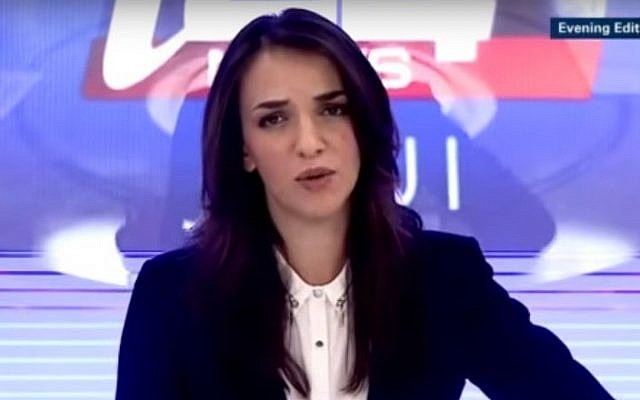
As presenter of the evening English news edition and head of prime time on i24news, an international news channel launched in 2013 and based in the Jaffa Port, Tel Aviv, Aharish says she feels more influential than on any local station.
“Bringing a different voice from Israel to the world is the biggest influence I could wish to have,” she said. “I try to explain to our viewers that life in Israel is almost impossible, yet we live it nonetheless.”
Thinking of her family as she lights the torch on Independence Day
Aharish was surprised to receive the phone call notifying her of the great honor to be bestowed on her, come April 23.
“I cried a bit,” she admitted. “I asked myself, ‘What have I done to deserve this?’ People started asking me why I merit this and who am I anyway. I ask myself the same question. There are people who’ve experienced much more difficult things in life than I have.”
When lighting the torch, Aharish will be thinking about her family sitting in the audience.
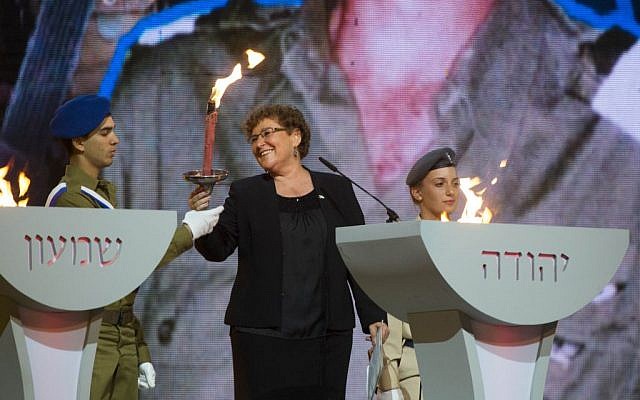
“This period [in journalism] has proven to me that my parents are always there for me, even when we disagree on my life-style choices. Despite everything, they’re very proud of me.”
Where will Aharish be in 10 years? Not necessarily in media, she thinks.
“I see myself managing a small café in Tuscany, which I will live next-door to,” she said. “The camera never interested me as my life’s mission. Giving lectures, consulting, sure. But I’m more interested in what goes on behind the scenes. The camera is just a bonus.”
Are you relying on The Times of Israel for accurate and timely coverage right now? If so, please join The Times of Israel Community. For as little as $6/month, you will:
- Support our independent journalists who are working around the clock;
- Read ToI with a clear, ads-free experience on our site, apps and emails; and
- Gain access to exclusive content shared only with the ToI Community, including exclusive webinars with our reporters and weekly letters from founding editor David Horovitz.

We’re really pleased that you’ve read X Times of Israel articles in the past month.
That’s why we started the Times of Israel eleven years ago - to provide discerning readers like you with must-read coverage of Israel and the Jewish world.
So now we have a request. Unlike other news outlets, we haven’t put up a paywall. But as the journalism we do is costly, we invite readers for whom The Times of Israel has become important to help support our work by joining The Times of Israel Community.
For as little as $6 a month you can help support our quality journalism while enjoying The Times of Israel AD-FREE, as well as accessing exclusive content available only to Times of Israel Community members.
Thank you,
David Horovitz, Founding Editor of The Times of Israel


